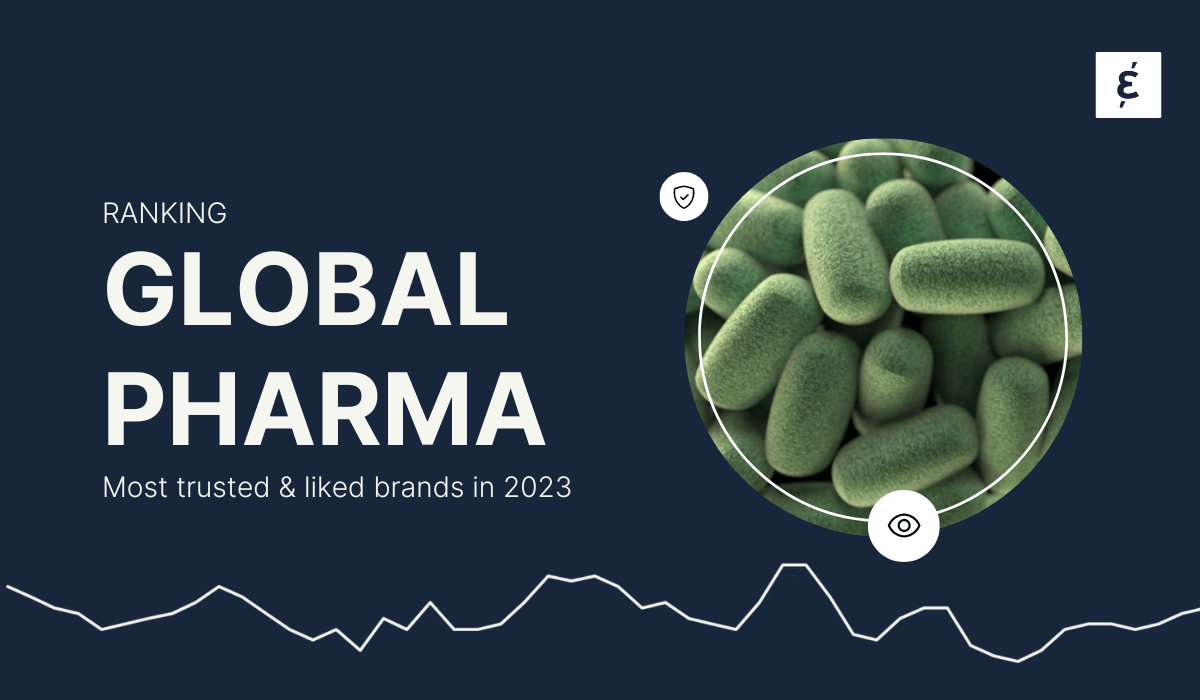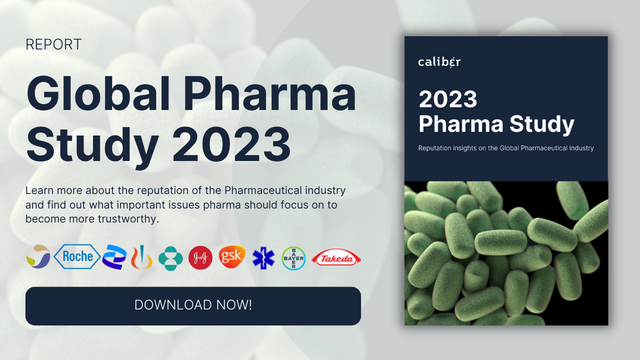
The global pharma industry— encompassing the largest pharmaceutical companies and biopharma companies — plays a crucial role in ensuring the health and well-being of people worldwide.
Driven by an aging population, a rise in infectious diseases and chronic conditions such as diabetes, along with continuous pharmaceutical research and innovative drugs, the global pharmaceuticals market is projected to grow by 5.39% from 2023-2027, reaching a market volume of $1435 billion by 2027.
In recent years, artificial intelligence and life sciences innovations have created new opportunities for pharmaceutical products and suppliers, further intensifying competition. With several companies striving to become a global leader, brand perception and reputation have become decisive factors — influencing how patients select providers, how employees choose workplaces, and how investors assess potential partners.
As a part of Caliber’s recent Global Pharma reputation study, we analyzed company reports, financial reports, and stakeholder feedback to better understand which reliable pharmaceutical brands are the most trusted and liked globally.
This report, based on insights gathered in 2022 from more than 17,600 people across seven countries — Brazil, China, France, Germany, Japan, the UK, and the US — highlights the pharmaceutical companies that stand out as market leaders in their regions
Global pharma is trusted for innovation—but not for integrity. The industry’s strongest reputation drivers are product quality and innovation, yet trust suffers due to concerns about pricing, drug safety, and ethics. The integrity dimension declined across multiple markets, showing a clear gap pharma must close.
According to the Global Pharma Study, pharmaceutical companies in 2022 were influenced more by inflation than by the lingering effects of COVID-19. Overall perceptions of the pharmaceutical industry, including drug discovery, medical devices, and clinical trial updates, remained steady despite global uncertainty.
The yearly Trust Like Score (TLS) for pharmaceutical companies was consistent with 2021, supported by reliable data and stable stakeholder sentiment. Yet, changing market trends and the Omicron variant briefly shifted public attention.
To maintain trust, pharmaceutical companies focused on data-driven insights, transparent reporting, and continued investment in innovation. Despite challenges, they advanced drug discovery, strengthened data integrity, and adapted to evolving market trends, reinforcing their role as resilient leaders in healthcare.
Read also: Why tracking ESG perception matters

In February, Russia’s invasion of Ukraine sparked a geopolitical conflict that drove up energy prices and inflation. The global focus shifted from the pandemic to financial instability, diverting attention from pharmaceutical companies.
Many companies struggled to sustain sales while developing new drugs amid disrupted supply chains and rising costs. Despite these pressures, resilient companies continued developing life-saving drugs and refining strategies to boost sales performance.
By late 2022, public perceptions centered on innovation, financial results, and the companies that succeeded in developing breakthrough drugs while maintaining steady sales growth.
Read also: Companies must be more honest and human to protect their reputation
The complex reputational situation for the pharmaceutical industry is expected to persist Factors such as affordability, access to medicine, financial earnings, ethics, and societal responsibility will continue to impact the industry’s global perception.
Furthermore, there are wide variations in perceptions across different markets, with the pharmaceutical industry having an average reputation globally but displaying significant differences in the average Trust and Like Score (TLS) between countries, with lower scores in Japan and higher scores in Brazil.
Read also: Why reputation matters more than ever
The Trust and Like Score for the pharmaceutical industry remained steady at an average-tier score of 67 in 2022, similar to pre-pandemic levels seen in 2019.
The industry continues to be perceived favorably in terms of its offering and innovation. However, perceptions of its integrity declined more than other reputation attributes.
Additionally, there was a downward trend in the industry’s overall brand expression, with perceived authenticity, relevance, and inspiration experiencing the most significant decline.
This shift in reputation and brand scores could be linked to the reduced visibility of the industry as the COVID-19 pandemic fades from public debate.
Our corporate reputation research model explains the journey from stakeholder interaction to business impact – comprising elements such as awareness, rational perceptions, trust and supportive behavior.
The Trust & Like Score is the ultimate metric that sums up the results of KPI’s which measure factors like perceived offering, innovation, integrity, relevance and many more.
In simple terms, the Trust & Like Score represents the overall brand reputation health.
| Rank | Company | TLS Score (2022) |
|---|---|---|
| 1 | Haleon | 73 |
| 2 | Takeda Pharma | 72 |
| 3 | AbbVie | 72 |
| 4 | STADA | 71 |
| 5 | Amgen | 71 |
| 6 | Boehringer Ingelheim | 71 |
| 7 | Novo Nordisk | 70 |
| 8 | Merck & Co (MSD) | 70 |
| 9 | Merck KGaA | 69 |
| 10 | Teva | 69 |
| 11 | Gilead Sciences | 69 |
| 12 | Roche | 69 |
| 13 | Bristol-Myers Squibb | 68 |
| 14 | Sanofi | 68 |
| 15 | GlaxoSmithKline (GSK) | 67 |
| 16 | Eli Lilly | 66 |
| 17 | BioNTech | 66 |
| 18 | Bayer | 66 |
| 19 | Novartis | 66 |
| 20 | J&J | 63 |
| 21 | Moderna | 62 |
| 22 | Pfizer | 60 |
| 23 | AstraZeneca | 59 |
“Building a solid reputation in the pharmaceutical industry requires a dedicated effort. The public demands not only cutting-edge innovation and safe, affordable products, but also a strong sense of purpose that extends beyond generating profits for shareholders. Companies like Haleon, Takeda, and Novo Nordisk are among the best-perceived companies in our index because they connect expertise with driving real change for patients. These companies show how they solve societal problems beyond delivering medicine. That is the expectation for pharma companies to build a strong reputation.”
Soren Holm Tweet

James is a communications strategist and senior content lead at Caliber, where he writes about corporate reputation, stakeholder intelligence, and brand trust. He draws on more than a decade of experience helping organizations turn data into stories that build credibility and connection.
According to the Global Pharma Study 2023, Haleon ranks as the most trusted and liked global pharma company based on Trust & Like Score (TLS). The top performers also include Takeda, AbbVie, STADA, and Amgen — all of which scored in the high 70s. These companies stand out for strong product offerings, innovation, and leadership, as highlighted on page 17.
Despite strengths in innovation and product quality, global pharma faces trust challenges due to concerns around drug pricing, safety, ethics, access to medicine, and perceptions of prioritizing profit over public health. The report shows integrity- and brand-related attributes declining globally, especially authenticity, relevance, and inspiration (page 7). These issues shape a “trust gap” the industry must actively address
COVID-19 significantly improved public perceptions, with over 50% of respondents globally saying the industry’s pandemic efforts increased their trust (page 11). This improvement was strongest in China and Brazil. However, as the pandemic faded, reputational gains eroded — particularly for vaccine producers like Pfizer and Moderna, whose scores dropped in 2022 (page 17).
The public expects pharma companies to prioritize drug safety, fair pricing, and putting health above profits. These issues consistently appear as the top three global trust drivers (page 13). In Europe and the US, the emphasis is “health over profits,” while Brazil and the US highlight affordability and pricing pressures. In Japan and China, drug safety is the top concern.
Younger people (18–44) tend to rate global pharma more positively because they have fewer direct healthcare experiences and stronger expectations around ethical behavior. The report shows younger audiences prioritize ethics over innovation, while older groups place more balanced importance on both (page 15). In contrast, people over 45 — those who rely on medicine more frequently — have significantly lower trust, likely due to gaps between treatment expectations and real-world patient experience (page 6).
You may also be interested in
Follow Caliber
Get the results of our latest research directly in your inbox!